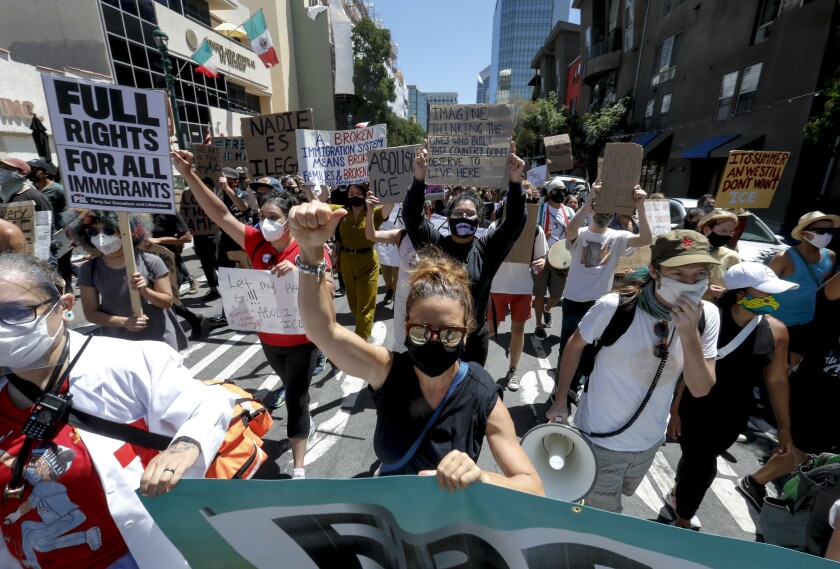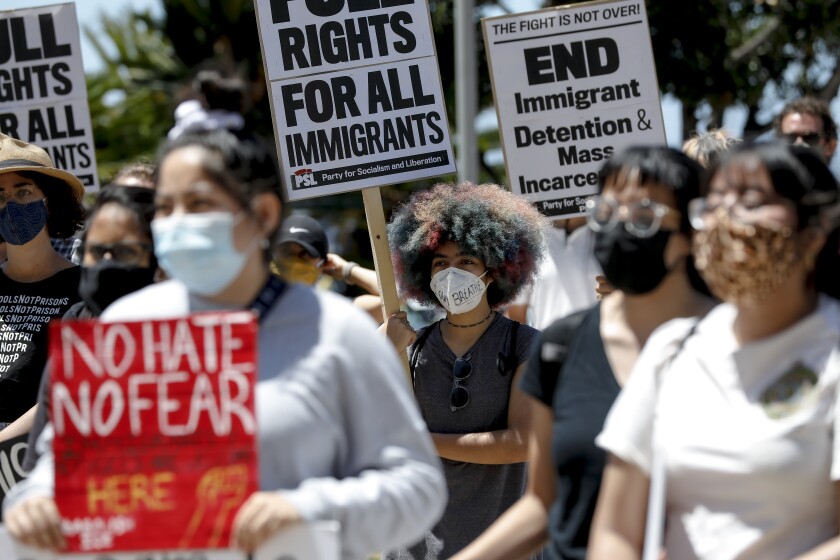
Protesters march during a Freedom For All demonstration on Saturday in Little Italy where the group stopped in front of the Mexican Consulate General office to call attention to better treatment for detained migrants.
(Nelvin C. Cepeda / The San Diego Union-Tribune)
(Nelvin C. Cepeda / The San Diego Union-Tribune)
Action on Saturday included a call to release migrants from detention, as well as a human prayer chain commemorating Martin Luther King Jr.'s historical efforts
By JOSHUA EMERSON SMITH,
GUSTAVO SOLIS
AUG. 8, 2020
7:51 PM
Hundreds of people rallied in downtown San Diego Saturday, loudly calling on the government to release migrants from the Otay Mesa Detention Center — a demand that has intensified in light of the highly contagious coronavirus.
Hours later, the call for social justice was quieter, even silent at times, as a small group gathered in prayer in Martin Luther King Jr. Memorial Park.
“There’s so much noise going on right now, so for us to be able to stand silently in the presence of the Lord and just pray is really powerful,” said organizer Asia Barrett.
The actions added to the momentum of the social and racial justice movement that has filled public spaces each weekend — and many days in between — this summer.
Around noon, about 300 people gathered at Waterfront Park, part of a statewide day of action drawing attention to conditions in prisons and jails, many which have especially been hard hit by the coronavirus.
Specifically, they called for the closure of the Otay Mesa Detention Center, where more than 200 immigration detainees and criminally-charged inmates have tested positive for the coronavirus. One detainee died from COVID-19.
“People are watching, and we’re not going to stop until everyone is free and all detention centers are closed and people aren’t profiting off people’s suffering,” said Ella Napa, who helped organize the event with the grassroots group Otay Mesa Detention Center Resistance.
A federal judge had ordered medically vulnerable detainees to be considered for release at the facility, leading Immigration and Customs Enforcement to let out just under 100 people in May. The same judge later declined to push for more releases, citing improved conditions in the facility.
CoreCivic, the private operator of the facility, has stressed that it has followed guidelines from the Centers for Disease Control and Prevention and stepped up its response to limiting the spread of the virus.

Ambre Decilap, center, marches Saturday calling for the closure of the Otay Mesa Detention Center in San Diego.
(Nelvin C. Cepeda / The San Diego Union-Tribune)
However, the fear of contracting COVID-19 remains for those still inside.
“From Palestine to Mexico all the walls have got to go,” the crowd on Saturday chanted. Many waved signs, such as: “Full rights for all immigrants” and “Abolish ICE.”
“The Otay Mesa Detention Center is a deadly place,” Simeon Man, a history professor at UC San Diego, told the gathering. “Calling it a detention center is a euphemism that hides the inherently deadly conditions of being locked up in a cage, deprived of human interactions, being deprived of healthy foods, sanitary conditions, medical provision.”
Immigration attorney Anne Rios, who works with those being held at facility, said for her the issue was “personal.”
“As a daughter of an immigrant and a witness to the horrible treatment that people receive in that prison, it’s imperative that we are here supporting the right for people to live freely and having their human rights protected,” she said.
Later Saturday evening — at precisely 6:01 p.m., the same time Martin Luther King Jr. was shot to death in 1968 — a group of demonstrators held a silent prayer at the Skyline park named after the civil rights leader.
The gathering, which drew about 30 people, was one of hundreds of silent demonstrations across the United States Saturday — all of them in streets, parks and memorials named after King.

Tiffany La Mar participates in a silent protest for “Pray on MLK” at Martin Luther King Jr. Memorial Park in San Diego on August 8, 2020.
(Ariana Drehsler)
Organizers say the silence serves two functions. First, it helps participants focus on the racial injustices that prompted demonstrations. Second, it is a reminder of the fact that Black women and men killed in racial acts of violence are unable to speak up for themselves.
Organizers chose this spot because of its name: Martin Luther King Jr. Memorial Park. They didn’t have much venue options.
“There aren’t that many MLK locations in San Diego,” said Courtney Lee, the other co-organizer.
They briefly thought of staging the event at on state Route 94, also known as Martin Luther King Jr. Freeway. But they didn’t like the idea of standing in silence in the middle of the freeway.
If this protest had happened in the late 1980s, the organizers could have held it along Market Street in downtown San Diego. The City Council renamed Market Street for King in 1986. But voters overturned that decision a year later.

Demonstrators sing at Martin Luther King Jr. Memorial Park in San Diego on August 8, 2020.
(Ariana Drehsler)
“I’m disappointed but not surprised,” Barrett said of the 1980s name change and sudden backtrack.
She noted that San Diego has a history of racial segregation, specifically when it comes to housing and limiting the neighborhoods Black and Brown people were able to live.
San Diego has a history of racially restrictive covenants, such as one from a home in the La Jolla Hermosa development that read: “No part of said property, or any buildings thereon, shall be used or occupied by any person not belonging to the Caucasian race, either as owner, lessee, licensee, tenant, or in any other capacity than that of servant or employee,” according to an article from The Voice of San Diego.
After the silent demonstration, the group formed a circle, sang worship songs, and read Bible verses that speak against injustice.
It’s part of what organizers called “holy activism.”
“It’s a place where we are bringing the Lord into our activism and we are not only trying to bring change in the natural — like changing laws or encouraging voting — but shifting the atmosphere,” Barrett said. “Because there is so much animosity when we talk about racism.”
Staff writer Kristina Davis contributed to this report.
(Ariana Drehsler)
“I’m disappointed but not surprised,” Barrett said of the 1980s name change and sudden backtrack.
She noted that San Diego has a history of racial segregation, specifically when it comes to housing and limiting the neighborhoods Black and Brown people were able to live.
San Diego has a history of racially restrictive covenants, such as one from a home in the La Jolla Hermosa development that read: “No part of said property, or any buildings thereon, shall be used or occupied by any person not belonging to the Caucasian race, either as owner, lessee, licensee, tenant, or in any other capacity than that of servant or employee,” according to an article from The Voice of San Diego.
After the silent demonstration, the group formed a circle, sang worship songs, and read Bible verses that speak against injustice.
It’s part of what organizers called “holy activism.”
“It’s a place where we are bringing the Lord into our activism and we are not only trying to bring change in the natural — like changing laws or encouraging voting — but shifting the atmosphere,” Barrett said. “Because there is so much animosity when we talk about racism.”
Staff writer Kristina Davis contributed to this report.
No comments:
Post a Comment